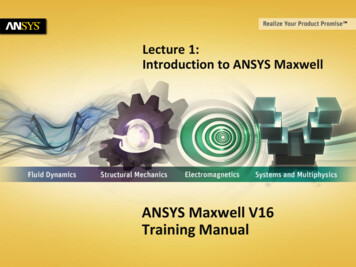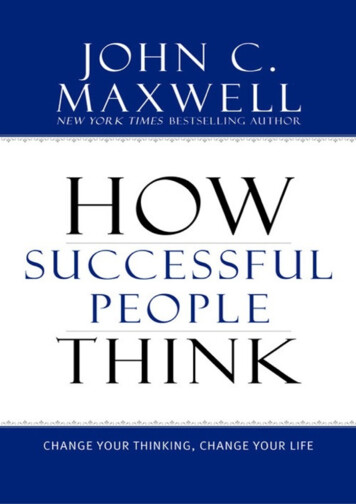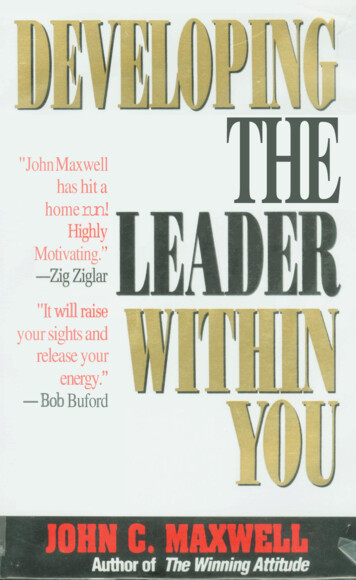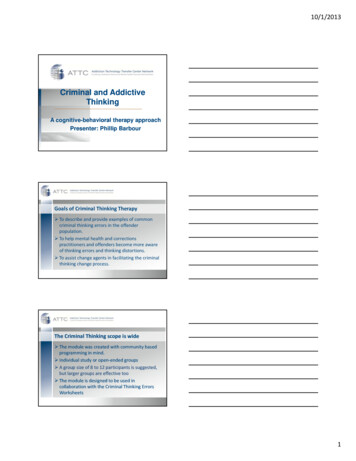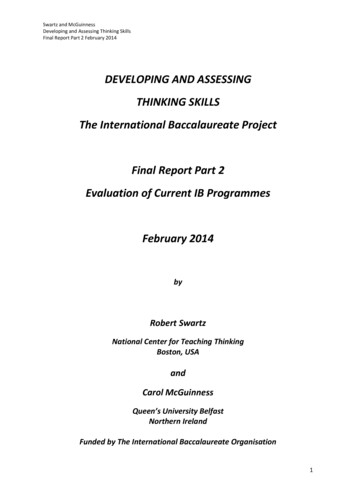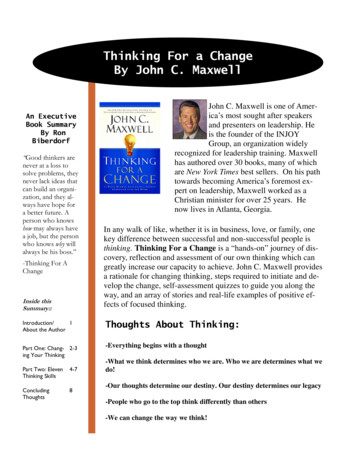
Transcription
Thinking For a ChangeBy John C. MaxwellAn ExecutiveBook SummaryBy RonBiberdorf“Good thinkers arenever at a loss tosolve problems, theynever lack ideas thatcan build an organization, and they always have hope fora better future. Aperson who knowshow may always havea job, but the personwho knows why willalways be his boss.”-Thinking For AChangeInside thisSummary::InsideStory2John C. Maxwell is one of America’s most sought after speakersand presenters on leadership. Heis the founder of the INJOYGroup, an organization widelyrecognized for leadership training. Maxwellhas authored over 30 books, many of whichare New York Times best sellers. On his pathtowards becoming America’s foremost expert on leadership, Maxwell worked as aChristian minister for over 25 years. Henow lives in Atlanta, Georgia.In any walk of like, whether it is in business, love, or family, onekey difference between successful and non-successful people isthinking. Thinking For a Change is a “hands-on” journey of discovery, reflection and assessment of our own thinking which cangreatly increase our capacity to achieve. John C. Maxwell providesa rationale for changing thinking, steps required to initiate and develop the change, self-assessment quizzes to guide you along theway, and an array of stories and real-life examples of positive effects of focused thinking.Introduction/1About the AuthorThoughts About Thinking:Part One: Chang- 2-3ing Your Thinking-Everything begins with a thoughtPart Two: ElevenThinking Skills4-7ConcludingThoughts8-What we think determines who we are. Who we are determines what wedo!-Our thoughts determine our destiny. Our destiny determines our legacy-People who go to the top think differently than others-We can change the way we think!
Part One: Change Your Thinking andChange Your LifeThe first portion of this book is devoted to an inspection of thinking. John C.Maxwell shows the reader how changing your thinking can change your life.Part one consists of three chapters that help the reader: understand how goodthinking can effect our lives, realize how changed thinking can impact successand, begin the journey towards mastering intentional thinking.“Life consists ofwhat a man isthinking aboutall day”-Ralph WaldoEmersonChapter 1: Understand the Value of Good ThinkingDo I believe that good thinking can change my life?John C. Maxwell begins this chapter discussing the difficulty of changing ourthinking. Some people have a difficult time with change in general. For manypeople, it becomes a life-long struggle. Maxwell submits that the largest barrier to making personal changes is feelings. He uses the following syllogismto help us understand the link between change and feelings:MAJOR PREMISE I can control my thoughts.MINOR PREMISE My feelings come from my thoughts.CONCLUSION I can control my feelings by controlling my thoughts!If we change our thoughts, we can change our feelings and our focus. Maxwell contends that success does not come from our college degrees or familybackground, but rather from the quality of our thoughts or the size of ourthinking.As is the case at the end of every chapter in this book, Maxwell makes thisstudy a “hands-on” affair by posing guiding questions to the reader to allowfor concentrated and deliberate consideration of the chapter. In this case,Maxwell has the reader consider whom he/she thinks are “good thinkers”and what makes them stand above the crowd. The reader is also encouragedto consider how his/her definition of “good thinking” has changed, and toidentify some personal or professional obstacles standing in the way of theirsuccess. Along with the meaningful stories throughout the book, this“workbook” approach to developing our thinking capacity is what gives thebook such impact!Thinking For A ChangePage 2One of the reasonspeople don’t achievetheir dreams is thatthey desire to changetheir results withoutchanging theirthinking.
Chapter 2: Realize the Impact of Changed ThinkingIs my desire for success and to improve my life strong enough toprompt me to change my thinking?Maxwell asserts that unsuccessful people need to change their thinking. He then asks, “But what aboutpeople who have achieved some degree of success?” How do these people move on to the next level ofsuccess? Do they too need to change their thinking? Maxwell then describes how Karen Ford, a formerschool teacher, used changed thinking to move up the ladder of success with Mary Kay Cosmetics. Fordhad immediate success as a Mary Kay consultant, and worked herself up the ladder very quickly based onher energy and desire. However, when she hit a point where she was no longer progressing, she had tolook inward rather than outward to overcome the obstacles. Karen Ford had to change herself and takepersonal responsibility for changing her thinking.Through the journey of Karen’s story, Maxwell outlines six steps towards taking responsibility for changedthinking:1.Changing your thinking changes your beliefs2.Changing your beliefs changes your expectations3.Changing your expectations changes your attitude4.Changing your attitude changes your behavior5.Changing your behavior changes your performance6.Changing your performance changes your LIFE!“Everyone thinksof changing theworld, but no onethinks of changinghimself.”-Leo TolstoyChapter 3: Master the Process of Intentional ThinkingAm I willing to pay the price to cultivate the habit of giving birth to,nurturing, and developing great thoughts every day?In this final chapter of the first section, Maxwell sets to put the wheels in place towards becoming achanged thinker. He states, “Becoming a good thinker isn’t overly complicated. It’s a discipline.” Like anydisciplines, becoming a master requires understanding of a process, devotion to the task, and refinement asrequired. Maxwell outlines the steps of intentional thinking as finding a place to: think your thoughts, shapeyour thoughts, stretch your thoughts, land your thoughts and finally, to fly your thoughts. Maxwell also suggests, in order to master this process, one should :-Expose yourself to good input-Expose yourself to good thinkers-Choose to think good thoughts-Act on your good thoughts-Allow your emotions to create another good thought-Repeat the processThe questions at the end of this chapter are designed to encourage a start for the process. Maxwell asks thereader to identify good thinking places, good thinkers and good input. He also has the reader identify anissue that could use some quality “think time” and to begin devoting some deliberate energy toward thatissue. It is the author’s way of helping the reader to get the ball rolling!Thinking For A ChangePage 3Ideas have ashort shelflife. Youmust act onthem beforethe expirationdate.
Part Two: Eleven Skills EverySuccessful Person NeedsThinking Skill #1: Acquire the Wisdom of Big-PictureYou have toThinkingJust as the title suggests, it is important to develop thinking beyond our ownpersonal needs and requirements. Big-picture thinkers take a holistic approach to problem solving. They attempt to look for ideas and solutions thatare out-of-the-ordinary, or in unchartered territory. According to Maxwell,big-picture thinkers learn continually. “They are always visiting new places,reading new books, meeting new people, learning new skills.” Big-picturethinkers listen intentionally. They realize that they have much to learn fromothers and ask strategic questions to increase their understanding. Anothersignificant characteristic is of big-picture thinkers is they look expansively.Maxwell states that, “It’s hard to see the picture while inside the frame.” People need to look beyond their world and see through the eyes of others. Finally, big-picture thinkers live completely. They expand their experiences by expanding their world. Through big-picture thinking, people accomplish more,have fewer unwanted surprises and are more tolerant of others and theirideas.think anyway, so whynot thinkbig?-DonaldTrumpThinking Skill #2: Unleash the Potential of FocusedThinkingEliminating distractions is the greatest challenge towards achieving focusedthinking. Focused thinkers can determine priorities and can concentrate onareas that can give them the most success. In fact, focused thinkers are ableand willing to give up some of the things they love in order to concentrateon priority areas. Focused thinkers can come to terms that, I can’t know everyone, I can’t do everything, I can’t go everywhere, and I can’t be well-rounded. In addition to prioritizing, focused thinkers also set aside deliberate scheduled times,daily and weekly to devote to thinking. Finally, focused thinkers continue tomonitor their progress by questioning their focus, their strategies and theirpriorities.Thinking For A ChangePage 4“He did eachthing as if hedid nothingelse”-Spoken ofNovelist CharlesDickens
Thinking Skill #3: Discover the Joy of Creative ThinkingInterestingly, Maxwell contends that one of his greatest weaknesses was creativity. Instead of hiding from this “flaw” he decided to pluck and steal creative ideas from other sources– people, books, etc. In fact, Maxwell becamean idea collector rather than creator. He stored good ideas, thoughts and quotesaway in journals and files, and retrieved them as required for his own purposes. This strategy not only fulfilled a need for good, creative ideas, it alsodeveloped a creative ability within Maxwell himself. Like big-picture thinkers, creative thinkers constantly ask questions and draw upon the ideas ofothers. Creative thinkers look for ways to connect ideas previously viewed asunconnected, seek new approaches for old ideas and look to connect ideasfrom other fields. Most importantly, creative thinkers do not fear failure, andlook to work in environments that support risk-taking and creativity.Thinking Skill #4: Recognize the Importance of Realistic ThinkingThis is probably the least “positive” or “upbeat” thinking skill that Maxwelldescribes. Realistic thinking involves consideration of the risks, down-sidesand worst-case-scenarios of a plan or idea. It also encourages a weighing ofpros versus cons and prepares the thinker for “less than expected” results.In the question section of this chapter, Maxwell also has the reader think realistically about themselves. The reader is instructed to gain insight abouthis/her own abilities and weaknesses by tapping into the observations offriends and colleagues. This feedback is to be used as a self-examining tool inorder to improve on areas of weakness and capitalize on strengths.Thinking Skill #5: Realize the Power of StrategicThinkingThrough strategic thinking, one is better able to break down complexissues into a more simplified, laid-out plan. Of considerable importanceis the identification of available resources, finding the right people foryour team, and being able to ask the right questions. Through strategic thinking, one is better able to identify the real issue and develop a plan that works.Thinking For A ChangePage 5“You can’t useup creativity.The more youuse, the moreyou have”-Maya Angelou“Actions alwayshave consequences; realisticthinking helpsyou to determinewhat those consequences couldbe.”-John C. Maxwell
Thinking Skill #6: Feel the Energy of PossibilityThinkingIn spite of technology that did not yet exist, a significant lack of investormoney, and an industry that did not believe in the possibilities, George Lucasproduced Star Wars, a movie beyond its time that influenced how movieswere made and marketed like no other before it or since. Lucas did not limithis vision to what was only conceivable at the time; rather he pushed the limits of technology to satisfy what he believed could exist. He stopped focusingon what had never been attempted and stretched the possibilities! Maxwellbelieves that all of us, just like Lucas, can achieve greater possibilities in thefuture if we extend the possibilities of today.Thinking Skill #7: Embrace the Lessons of ReflectiveThinkingMaxwell states that he is a person of action. He has very high energy andlikes to get things accomplished. Not in spite of this, but rather to compliment it, he also claims it very necessary to be reflective about his actions. Reflective thinking gives you perspective, brings the big picture into focus andhelps distinguish important ideas from trivial. Reflective thinking not onlykeeps you grounded about the task at hand, but also is used to take stock onhow your life is going as a whole.Thinking Skill #8: Question the Acceptance of Popular ThinkingMaxwell warns against following popular thinking:-popular thinking sometimes means not thinking for yourself-popular thinking offer false hope-popular thinking is slow to embrace change-popular thinking only brings average results.Two interesting antidotes to following popular thinking are to constantly trynew things in new ways and to get used to being uncomfortable. Followingthe status quo is comfortable, but it is no way to effect positive change!Thinking For A ChangePage 6“Theunexaminedlife is notworth living”-Socrates
Thinking Skill #9: Encourage the Participation ofShared ThinkingMaxwell has highlighted the value of surrounding yourself with goodpeople throughout this book. In this chapter, Maxwell outlines how placinghigh value on the contribution of others and thereby utilizing “shared thinking” can be faster, more innovative, and stronger than working by yourself.He also concludes that “shared thinking” produces more mature results andreturns greater value than “solo thinking”. To encourage the start of betteruse of a team approach, Maxwell encourages the reader to make a list ofgood thinkers and to identify their area of strength. This way, tapping the resource can be much quicker when required.“None of us isas smart as allof us.”-Ken BlanchardThinking Skill #10: Experience the Satisfaction of Un- “Little did Iselfish thinkingrealize thatNot all of our thinking time should be devoted to our own problems, tasksand initiatives. Thinking for a Change is a journey about making improvementsin our lives. Maxwell contends that helping others with their tasks, or providing “unselfish thinking” can bring about personal rewards of satisfactionand humanity, which are just as fulfilling as personal extrinsic rewards. Butdo not be confused; this chapter is not about charity. By investing in thosearound you, you gain better collaboration and more effective teamwork foryour own endeavors too!my desire toadd value toothers wouldbe the thingthat addedvalue to me!”-John C. MaxwellThinking Skill #11: Enjoy the Return of Bottom-LineThinkingSuccess is not always measured in money or personal gain. Maxwell indicatesthat the bottom-line can be thought of as, “.the end, the take away the desiredresult.” Regardless of what your bottom line is however, it is important to establish benchmarks to see if you are doing what you intended on doing, andto ensure that you have not steered off the path, clouded the picture, or created mismatches. Bottom-line thinking helps provide clarity, generates highmorale, helps you assess every situation and ensures your future. It is important to develop a strategy for achieving results and put your effort into execution. From a personal standpoint, areas such as career, marriage, family andrecreation can also be more fulfilling when bottom-line goals are established.Thinking For A ChangePage 7“If you want to besuccessful tomorrow, you need tothink bottom linetoday”-John C. Maxwell
Concluding ThoughtsMaxwell ends his book by offering, “May thinking become your greatest toolfor creating the world you desire.” Thinking for a Change does not tell youwhat to think, but rather- how to think. This book is a process. It has startingpoints, checkpoints and points of interests. It taps the minds, thoughts and actionsof the famous, the greats and the successful. It gives meaningful and useful answers for our questions about thinking and success:-How can changing my thinking change my life?-How have others effected positive changes through thinking differently?-How can I get started thinking differently?-Who can help me with changing my thinking?-How will I know if I am on the right track?From the Lighter Side.“Outside of the killings, Washington has one of the lowest crime rates in the country.”-Marion Barry,former Washington, D.C., mayor“The police are not here to create disorder.They’re here to preserve disorder.”- MAYOR RICHARD DALEY, during 1968 DemocraticNational Convention in Chicago“A bus station is where a bus stops. A train station is where a Train stops. On my desk, I havea workstation ”- AUTHOR UNKNOWN“If it is true that we are here to help others,then what exactly are the OTHERS here for?”- AUTHOR UNKNOWN“Things are more like they are now than they ever were before.”- DWIGHT D. EISENHOWER,thirty-fourth president of the United States“Everything that can be invented has been invented.”- CHARLES H. DUELL,director of the U.S. Patent Office, 1899“Ever since I was a kid, I’ve always been a real deep thinker and stuff.”- BILLY RAY CYRUS, country music singer
John C. Maxwell is one of Amer-ica’s most sought after speakers and presenters on leadership. He is the founder of the INJOY Group, an organization widely recognized for leadership training. Maxwell has authored over 30 books, many of which are New York Times best sel
